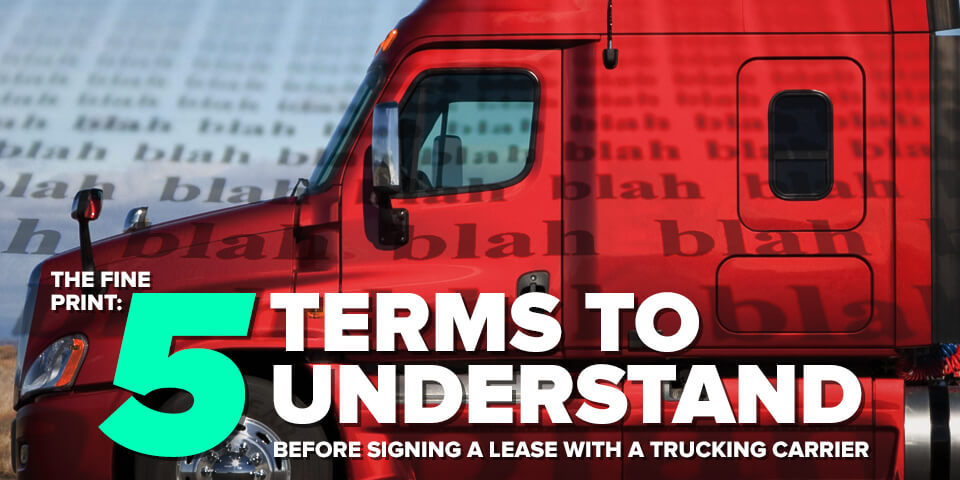In The News

The Fine Print: 5 Terms to Understand Before Signing a Lease with a Trucking Carrier
The lease you sign as an owner-operator with a trucking carrier sets the guidelines for your income--how your pay will be calculated, when you'll get paid, and what fees and expenses you'll be required to cover.
But it's your responsibility to understand all that's in the lease agreement before you sign it. Otherwise there could be unpleasant surprises that put your business--and financial future--at risk. So, here are five important terms to evaluate before signing on with a trucking carrier.
#1. Fuel surcharge
A fuel surcharge is billed to the shipper and paid to the owner of the truck to compensate for fluctuations in the price of fuel.
"Since deregulation in the early 1980s, rates to trucking companies have not increased significantly. So, one way they've covered the additional costs caused by volatile fuel prices is through fuel surcharges," says John Mueller, founder of The Transportation Station LLC, a Toledo, Ohio-based consulting firm that provides a full-range of regulatory and safety compliance services to trucking companies.
Mueller says it's important for owner-operators to get a basic understanding of how fuel surcharges work and how the carrier determines the amount paid to the owner-operator. (To dig deeper on this topic, check out the Fuel Surcharge Calculator on the Owner-Operator Independent Drivers Association website.)
#2. Detention pay
Does the contract include detention pay for having to sit and wait for a late shipper or receiver?
"Detention pay refers to those instances where I'm told to show up at a shipper by eight o'clock this morning for pick up, and I arrived there on time, but now I've waited two hours and fifteen minutes still waiting to be unloaded," says Mueller. "I'm running out of my own hours and it's costing me money as an owner-operator. So, you want to know: 'When does detention pay kick in? How much will I be paid?'"
And how do carriers typically address detention pay?
"They may come up with a fixed rate for the driver, depending on the size of vehicle, such as having a certain rate per hour for cargo vans, a different rate for straight trucks, and another rate for tractor-trailers," says Mueller. "And they also may pay it in different time increments. For example, a lot of carriers pay in 15 minute increments."
#3. Compensation formula
Will you be paid on a "loaded mile" rate or percentage of freight?
If the contract specifies that you're paid on loaded miles, how are the "loaded miles" determined? Is it by PC*Miler or another truck routing and mileage software system?
"After all, your pay is not based on the actual miles that the truck travels otherwise you'd have drivers driving around the block a hundred times," says Mueller.
If the contract says that you're paid on percentage of freight, determine what that percentage is. "And then you should ask a question that goes a step deeper: 'Is that percentage based on 100-percent of the actual bill that you are sending the customer?'" advises Mueller. "Some carriers have funky ways of doing things with the percentages instead of just making it simple and saying, 'Look, whatever we bill the customer, we're going to give you 70-percent (or whatever the percentage) of that bill.'"
The bottom line: if you're getting paid on loaded miles, find out exactly what the carrier means by "loaded miles." And if you're getting paid on percentage of freight, know how that percentage determined. This way, you can run the numbers and more accurately compare which pay plan is best for you.
#4. Usage fees and miscellaneous charges
Your compensation package might look great at first glance. But charges for satellite usage fees, special equipment, or license plate fees could quickly eat away your profits, if you don't account for them ahead of time.
Also consider how liability insurance coverage is paid. Some carriers will cover the expense of the insurance for owner-operators; others will charge it back. It all depends on what's written in the lease agreement.
#5. Fuel taxes
Fuel taxes are payable to each state based on fuel consumption of the truck in that state. So, what does the lease contract say about who is responsible for paying the fuel mileage taxes? Does the carrier pay the taxes and charge them back to you? Or are you responsible to file the fuel taxes and pay them directly?
"Most carriers want to file fuel mileage taxes as a fleet because if you allow your owner-operators to file on their own, and they don't do their filings like they should, the states will come back to the motor carrier and ask them to pay," says Mueller. "But you want to be clear about that upfront."
The Bottom Line
Most expedited trucking carriers try to do the right thing when it comes to offering fair terms in their lease agreements with owner-operators. But there can be a mismatch of expectations or a misunderstanding about what certain terms mean that lead to unpleasant surprises for both parties. So, why take the risk? With your business future at stake, invest the time upfront to understand the terms being offered to you in the lease so that you can make the best decision for your future.
